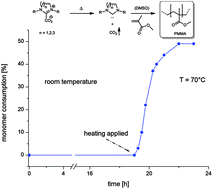Polymerization of methyl methacrylate by latent pre-catalysts based on CO2-protected N-heterocyclic carbenes†
Abstract
Various carbon dioxide-protected

* Corresponding authors
a
Institute of Polymer Chemistry, University of Stuttgart, Pfaffenwaldring 55, D-70569 Stuttgart, Germany
E-mail:
michael.buchmeiser@ipoc.uni-stuttgart.de
b Evonik Industries, Marl, Germany
c Institute of Organic Chemistry, University of Stuttgart, Pfaffenwaldring 55, D-70569 Stuttgart, Germany
d Institute of Textile Chemistry and Chemical Fibers, Körschtalstr. 26, D-73770 Denkendorf, Germany
Various carbon dioxide-protected

 Please wait while we load your content...
Something went wrong. Try again?
Please wait while we load your content...
Something went wrong. Try again?
S. Naumann, F. G. Schmidt, R. Schowner, W. Frey and M. R. Buchmeiser, Polym. Chem., 2013, 4, 2731 DOI: 10.1039/C3PY00073G
To request permission to reproduce material from this article, please go to the Copyright Clearance Center request page.
If you are an author contributing to an RSC publication, you do not need to request permission provided correct acknowledgement is given.
If you are the author of this article, you do not need to request permission to reproduce figures and diagrams provided correct acknowledgement is given. If you want to reproduce the whole article in a third-party publication (excluding your thesis/dissertation for which permission is not required) please go to the Copyright Clearance Center request page.
Read more about how to correctly acknowledge RSC content.
 Fetching data from CrossRef.
Fetching data from CrossRef.
This may take some time to load.
Loading related content
